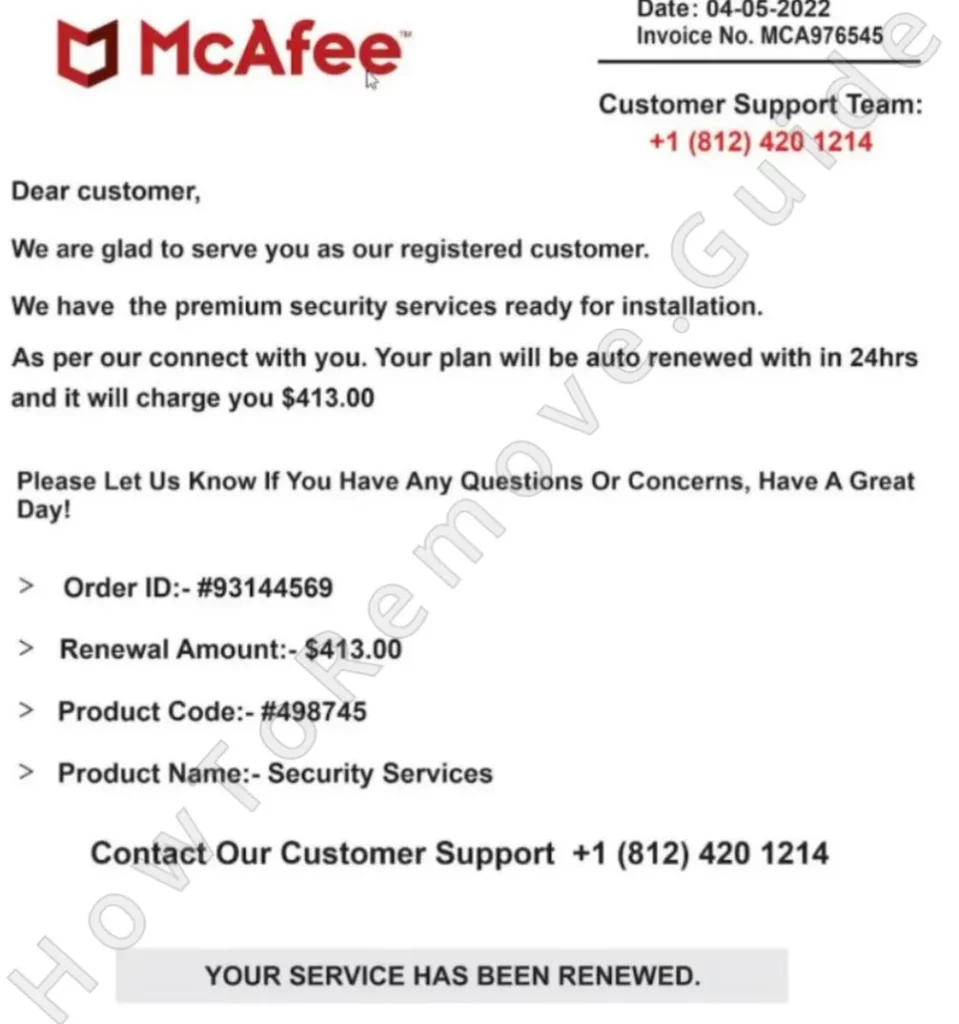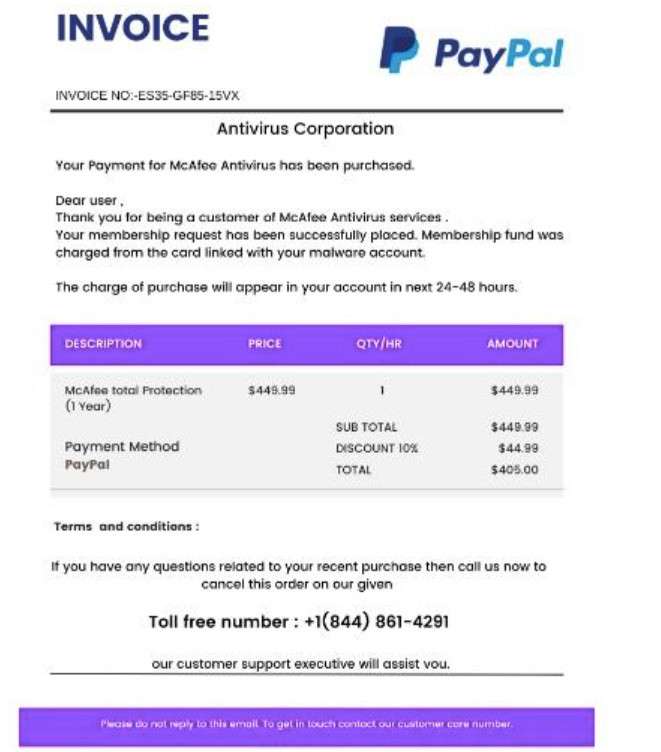McAfee Invoice Scam: Stay Alert, Stay Safe
Imagine this: You receive an email from what seems to be a trusted source like McAfee, asking you to pay an outstanding invoice. It sounds legit, right? But hold on—what if it's a scam designed to steal your hard-earned cash and personal info? McAfee invoice scam is a growing threat that’s catching unsuspecting victims off guard. In this article, we’ll break down everything you need to know about this sneaky scam, how to spot it, and most importantly, how to protect yourself.
Let’s face it, phishing scams are nothing new in the digital world. But McAfee invoice scams have taken things to a whole new level. These scammers are crafty—they mimic official communication so well that even tech-savvy folks can fall for it. So, whether you're a small business owner or just someone trying to stay safe online, this guide is here to help you out.
Before we dive deep into the nitty-gritty, let’s clear the air: McAfee will never ask you to pay invoices through random links or emails. If you’ve ever wondered if that email you got was legit, you’re not alone. This article aims to demystify McAfee invoice scams, giving you the tools to spot them and avoid becoming another statistic.
Read also:Pepper0 The Ultimate Guide To Unlocking Its Potential
What is McAfee Invoice Scam?
McAfee invoice scam is essentially a form of phishing where cybercriminals send fake invoices to individuals or businesses pretending to be McAfee. These scams often come in the form of emails that look official, complete with McAfee logos and branding. The goal? To trick you into clicking malicious links or handing over sensitive information.
Here’s the kicker: these scammers don’t just stop at emails. They may also send fake invoices via text messages or even call you pretending to be McAfee support. Once you click on the link or provide your details, they can steal your money, personal data, or even gain access to your computer.
How McAfee Invoice Scams Operate
So, how do these scammers operate? Let’s break it down:
- Email Spoofing: Scammers create email addresses that look almost identical to official McAfee emails. A single letter or symbol difference can make all the difference.
- Phony Links: The emails often contain links that lead to fake websites designed to steal your info.
- Pressure Tactics: Scammers use urgency to push you into acting fast, like threatening late fees or account suspension if you don’t pay immediately.
These tactics are designed to play on your emotions—fear, urgency, and trust—and they work more often than you’d think.
Common Signs of McAfee Invoice Scams
Spotting a scam can be tricky, but there are tell-tale signs you should look out for. Here’s what to watch out for:
- Generic Greetings: If the email starts with "Dear Customer" instead of your actual name, it’s a red flag.
- Urgent Language: Phrases like "Immediate action required" or "Your account will be suspended" are classic scam tactics.
- Unusual Payment Methods: McAfee won’t ask you to pay via cryptocurrency or prepaid gift cards.
- Spelling and Grammar Mistakes: Legitimate companies proofread their emails. Scammers? Not so much.
By staying vigilant and knowing what to look for, you can avoid falling victim to these scams.
Read also:Onlyfans Lara A Deep Dive Into The Rise Impact And Secrets Of Success
Why Should You Care About McAfee Invoice Scam?
This isn’t just about losing money—it’s about protecting your identity and digital security. McAfee invoice scams are part of a broader category of cybercrimes that can lead to identity theft, financial fraud, and even compromise your entire network. Think about it: if a scammer gets access to your personal info, they can use it to open fake accounts, drain your bank accounts, or even sell your data on the dark web.
Plus, if you’re running a business, falling for a scam like this can damage your reputation and cost you customers. In today’s digital age, cybersecurity isn’t just a nice-to-have—it’s a must-have.
The Financial Impact of McAfee Invoice Scams
According to a report by the FBI’s Internet Crime Complaint Center (IC3), phishing scams cost victims over $54 million in 2022 alone. That’s a staggering number, and it’s only growing. McAfee invoice scams might seem small compared to other cybercrimes, but they add up quickly, especially when targeting small businesses or individuals.
And here’s the kicker: once your money is gone, it’s almost impossible to get it back. Scammers often operate from overseas, making it difficult for law enforcement to track them down.
How to Protect Yourself from McAfee Invoice Scams
Prevention is key when it comes to staying safe from McAfee invoice scams. Here’s a step-by-step guide to help you out:
- Verify the Sender: Always double-check the email address. Hover over the sender’s name to see the actual email address.
- Avoid Clicking Links: Instead of clicking on links in suspicious emails, go directly to McAfee’s official website.
- Use Multi-Factor Authentication (MFA): This adds an extra layer of security to your accounts, making it harder for scammers to access them.
- Install Anti-Phishing Software: Tools like McAfee’s own antivirus software can help detect and block phishing attempts.
Remember, the best defense is a good offense. By taking proactive steps, you can significantly reduce your risk of falling victim to these scams.
Real-Life McAfee Invoice Scam Stories
Let’s talk about some real-life examples of McAfee invoice scams. These stories highlight just how convincing these scammers can be:
Case 1: A small business owner in California received an email claiming he owed McAfee $2,500 for software licenses. The email included a detailed invoice and a link to pay online. Thinking it was legitimate, he clicked the link and entered his payment info. It wasn’t until later that he realized the email address was slightly off—just one letter different from McAfee’s official domain.
Case 2: Another victim, a freelance graphic designer, got a text message saying her McAfee subscription was about to expire. The message included a link to renew her subscription. She clicked the link and entered her credit card details, only to find out later that her card had been charged repeatedly over the next few weeks.
These stories serve as a reminder that no one is immune to these scams. Even smart, tech-savvy individuals can fall victim if they’re not careful.
Lessons Learned from Real-Life Scams
From these cases, we can draw some important lessons:
- Double-Check Everything: Don’t assume an email or text is legit just because it looks official.
- Trust Your Instincts: If something feels off, it probably is.
- Report Suspicious Activity: If you suspect you’ve been scammed, report it to the authorities and McAfee immediately.
By learning from others’ mistakes, you can avoid making the same ones yourself.
McAfee’s Role in Fighting Scams
McAfee takes these scams seriously and works hard to combat them. They regularly update their security software to detect and block phishing attempts. Additionally, they provide resources and guides to help users stay safe online.
Here are some ways McAfee helps fight scams:
- Security Updates: McAfee releases regular updates to their software to patch vulnerabilities.
- Education and Awareness: They offer tutorials and guides to help users recognize and avoid scams.
- Customer Support: If you suspect you’ve been scammed, McAfee’s support team is available to assist you.
While McAfee can’t stop all scams, they’re doing their part to make the internet a safer place.
Steps to Take if You’ve Been Scammed
If you’ve fallen victim to a McAfee invoice scam, don’t panic. Here’s what you should do:
- Report the Scam: Contact your bank or credit card company immediately to dispute the charges.
- Change Your Passwords: Update all your passwords, especially for accounts related to the scam.
- Run a Security Scan: Use McAfee or another trusted antivirus software to scan your device for malware.
- File a Complaint: Report the scam to authorities like the FBI’s IC3 or your local police department.
Acting quickly can minimize the damage and prevent further issues.
Recovering from a McAfee Invoice Scam
Recovering from a scam can be a long and frustrating process. Here are some tips to help you get back on track:
- Monitor Your Accounts: Keep a close eye on your bank and credit card statements for any suspicious activity.
- Freeze Your Credit: If you’re worried about identity theft, consider freezing your credit to prevent new accounts from being opened in your name.
- Seek Legal Advice: If the scam caused significant financial damage, consulting a lawyer may be necessary.
Remember, you’re not alone. There are resources and support systems available to help you recover.
Future Trends in Cybersecurity
As technology evolves, so do the tactics of cybercriminals. McAfee invoice scams are just one example of how scammers adapt to new opportunities. Here’s what to expect in the future:
AI-Powered Scams: Scammers are starting to use AI to create more convincing phishing emails and fake invoices. These emails can mimic your writing style or even impersonate people you know.
Quantum Computing Threats: As quantum computing becomes more mainstream, it could pose new challenges to cybersecurity, potentially breaking traditional encryption methods.
Staying ahead of these trends means being proactive and informed. Keep yourself updated on the latest threats and solutions to stay safe online.
Final Thoughts: Be Smart, Stay Safe
McAfee invoice scams might seem scary, but armed with the right knowledge and tools, you can protect yourself and your loved ones. Remember, the key is vigilance—always double-check emails, avoid clicking suspicious links, and use strong security software like McAfee to stay safe.
So, what’s next? Share this article with your friends and family to help them stay informed. And if you’ve got any questions or experiences to share, drop a comment below. Let’s work together to make the internet a safer place for everyone!
Stay safe out there, folks!
Table of Contents
- What is McAfee Invoice Scam?
- Common Signs of McAfee Invoice Scams
- Why Should You Care About McAfee Invoice Scam?
- How to Protect Yourself from McAfee Invoice Scams
- Real-Life McAfee Invoice Scam Stories
- McAfee’s Role in Fighting Scams
- Steps to Take if You’ve Been Scammed
- Future Trends in Cybersecurity
- Final Thoughts


